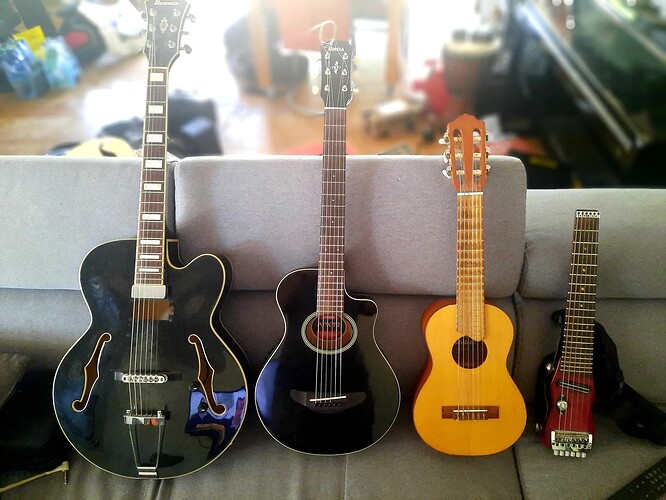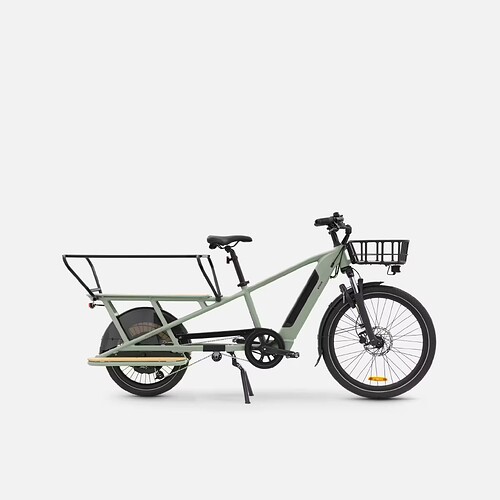@diswest I see your point, agreed on technique, but my point is that it isn’t beginner friendly!
Learning mute techniques is really interesting btw !
Headless guitars tuners can be annoying and limited if you want to try different tunings. Harder to try and change different string gauges too. Baritone or 7/8 strings headless guitars don’t seem common.
My headless guitar is the opposite of a baritone : higher fourth A tuning, like Guitalele. Space saving, jacket pocket friendly.
With an octaver pedal, you get a pocket baritone. ![]()
I can also give that a try, but I’ll keep figuring it out.
This setup looks nice for me, but I am mainly looking into this only because the right samples are starting to become a headache with me for my current gear.
This Rockburn is the guitar we have (minus the tremolo arm) but the pick guard’s become yellow and the quality’s overall degraded from almost zero maintenance (even though it’s seen almost zero use). Plus I don’t want to keep changing to and from strings on it just to have a drop-C tune without fret buzz in the few times I do use it.
Late reply but I also picked it up again recently after playing a bit on High School . I was at, I dunno, halfway intermediate level in the sense that I could play famous solos, tap out licks and such – but I really had little idea or inclination to go much past that.
Fast forward twenty years and now I have no inclination to play covers, but to use the guitar as a method of self-expression, mostly through ambient loops and textural droning.
What I have found helpful is going through the pickup music CAGED system course thing-y. I’m not forced to learn a heap of classic guitar songs to cover, and it’s really just a way to work with some sort of guidelines for self playing-- at least that’s what I’m finding. If you can remember how to play basic open/bar chords, do a few lil hammer ons, pull offs and slides then you will keep up fine, on the other hand If you know your major/minor scales and pentatonics inside out and can freely move between them then your probably already past it though.
It’s definitely cool being able to do something in Ableton and then know that I can work with it on the Guitar, or vice versa.
I may consider that website for courses, just trying to figure out a guitar and/or if I can commit, especially with other expenses I have to worry about.
(post deleted by author)
Haven’t checked in on this thread in a couple of weeks, seems like we’re talking about low tunings. Big fan.
I keep a couple of guitars tuned to low A standard like the A on a bass (or one step below standard baritone tuning), this has become my go-to tuning the last couple years. They are both standard fender scale length (25.5"), one is a reverend and the other is branded as a kramer but was made by esp in japan. The kramer has a floyd and I’m able to get that tuning stable with fairly normal extra heavy strings. The reverend has a wilkinson two point trem and i had to use a 7 string set to achieve this tuning. Both required some goofy setup tricks to get good intonation but it was a lot easier with the floyd since they’re so adjustable.
The highest i tune any of my guitars is D standard, E just doesn’t speak to me.
I still haven’t found the time to make a body for the bass vi neck i picked up but i’m very excited about that future prospect. I’ve just been busy.
I also have an 8 string classical guitar but i don’t play it much these days which is a shame as it’s a nice guitar. I think i went too hard on classical playing at one point and burned myself out. I should probably sell it.
I used to play a lot of metal but i haven’t much in the last decade or so, it’s just gotten heartbreakingly stale and I’m inspired by plenty of other things.
@sjl2025 you said in one post that you wanted to tune to drop C (or maybe C standard, i forget). You can do this without any particularly special guitar requirements. The last time i played guitar in a death metal band i tuned to C standard on a cheap 80s warlock copy (a brand called “phantom”) with a non-locking trem. I was able to get satisfactory results with a set of 11s or 12s if i remember correctly. This was a guitar someone was throwing in the garbage, nothing special. Standard scale too. I had to do a setup to make it work but nothing crazy. That’s just part of experimenting with tunings and string gauges, every player should learn the basics of a setup. Buy what you want but I’m just saying you can go cheap to get your feet wet and decide whether you want to upgrade later or not.
I got my own guitar, the Harlem Headless from Gear4Music.
I could do it with the guitar we already have, but it suffered from fret buzz if I tuned it down low to drop C. I’d also not want to have to restring that guitar (regular one with a head) constantly as even occasionally my sister and father use it, and the music they’re into uses regular or brighter tunings.
Oh cool, i guess i missed that. Congrats. Glad you got yourself setup. I hope it works for you.
I’d still strongly recommend you (or anyone, not just you) learn the absolute basics of guitar setup and adjustment, just like i’d say say anyone who engages regularly with anything should be able to do the most basic maintaining/ repairing that relates to that thing. Like if you have a car you should be able to change fluids, tires, simple parts like alternators, or if you ride a bike you should be able to patch tures, replace a chain, adjust breaks, tension a derailleur, etc, or if you live in any standard building you should be able to replace a door knob or light switch, fix a leaky faucet, know how your heating system works, or if you use a computer you should know how to swap ram, work in bios, etc, you get the idea. Hell, i think everyone who makes hardware based electronic music should know how to solder, especially if they like vintage and used stuff.
![]() Unfortunately I don’t really know a lot about maintenance stuff, even with my bike I can’t replace its chain or adjust the derailleur correctly. Only reason I have a bike is because I work awkward hours and I refuse to use a car to get to work, and if I were to get a full license and a car, it’d be electric anyway since I don’t want to bother with gas for something I own (even if I could handle the mechanical complexity). I don’t imagine myself driving much.
Unfortunately I don’t really know a lot about maintenance stuff, even with my bike I can’t replace its chain or adjust the derailleur correctly. Only reason I have a bike is because I work awkward hours and I refuse to use a car to get to work, and if I were to get a full license and a car, it’d be electric anyway since I don’t want to bother with gas for something I own (even if I could handle the mechanical complexity). I don’t imagine myself driving much.
With my guitar I’d at most only hope to have to mess around with the strings considering the diverse array of tunings that are needed for the songs I like.
I should clear out a whole bunch of stuff. The only reason I’m moving to hardware is to minimise distractions, and even then I’m keeping my hardware setup minimal.
I rambled a bit there but what i was trying to say was that everyone benefits from knowing how to do the basics with the stuff they own/ use. It saves time, money, and frustration. You say you don’t know a lot about maintenance stuff, nobody does until they learn it. Almost none of it is difficult to do, you just need to bother learning or you’ll inevitably end up hiring someone like me to fix your stuff for you and, if i don’t know you, you won’t like what i charge. Guitar and bike mechanics are especially accessible and are great places to start being handy, though with guitar you do have to sort through a lot of superstition and misinformation.
lol
Might also consider a guitar plugin (to multisample into my tangerine) but it can’t hurt to learn guitar I guess. Of course, I could just be throwing away money but I’ll think about it.

